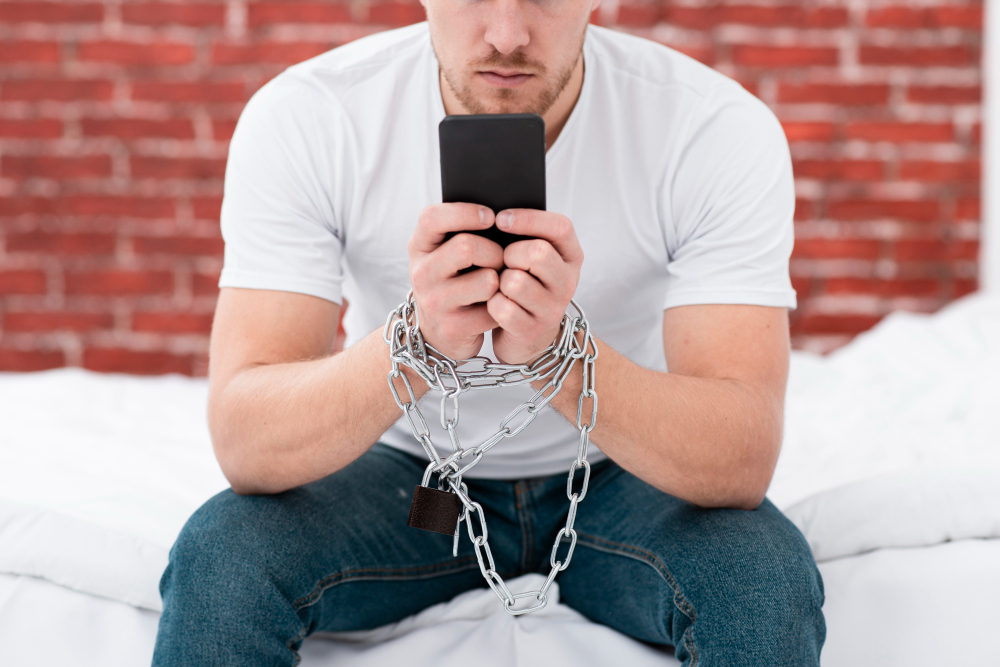Nomophobia: The Fear of Being Without Your Mobile Phone
Nomophobia: The Fear of Being Without Your Mobile Phone. Nomophobia, short for "no mobile phone phobia." Is a modern-day anxiety stemming from the fear of being without a mobile device.
HUMAN BEHAVIOREVERYDAY LIFE
K.N.
7/25/20253 min read


What is Nomophobia?
Nomophobia, short for "no mobile phone phobia." Is a modern-day anxiety stemming from the fear of being without a mobile device. It encompasses the unease and distress individuals may experience when separated from their smartphone. Often leading to feelings of isolation and disconnection.
The roots of nomophobia stem from humanity's innate desire for connectivity and communication, which smartphones conveniently facilitate. In today's fast-paced world, mobile phones are not just devices for making calls or sending texts; they serve as portals to social media, email, navigation tools, and various applications that enhance our daily routines. Consequently, the absence of a mobile phone can trigger feelings of disconnection, anxiety, and inconvenience, leading to psychological symptoms that characterize nomophobia.
Furthermore, the reliance on mobile phones for communication, information, and entertainment has contributed to the deep-seated worry experienced by those affected by nomophobia, highlighting the pervasive nature of this phenomenon in contemporary society.
Causes of Nomophobia
Nomophobia, the fear of being without a mobile phone, is a significant psychological issue in the digital era. Societal pressure to stay connected to avoid social exclusion, coupled with the influence of social media platforms, can intensify the cycle of dependence. Demographic factors, such as gender, socioeconomic status, and cultural background, can also shape an individual's susceptibility to nomophobia. Understanding these factors is crucial for addressing the psychological implications of this modern phenomenon.
Signs and Symptoms of Nomophobia
Feeling like you can't go without your phone
Trouble sleeping because you're always checking your phone
Not doing well in school or work because of your phone use
Feeling tired, having dry eyes, and eye strain from looking at your phone too much
Feeling anxious when you don't have your phone with you
Avoiding places with no cell phone coverage
Always keeping your phone on
Spending less time with friends and family due to being on your phone
By recognizing these symptoms and seeking help, you can start to overcome your cell phone addiction and lead a healthier, more balanced life.
Who Can Benefit from Treatment?
If you constantly feel nervous, anxious, or have a fear of being without your phone, then treatment for nomophobia can help improve your mood and mental well-being. You'll also learn how to use technology in a way that enhances your life without becoming dependent on it.
Coping Strategies and Treatments for Nomophobia
One of the best ways to treat cell phone addiction is to slowly reduce the amount of time spent on your phone. Nomophobia, the fear of being without a mobile phone, can be overcome through coping strategies and treatment. Digital detox, a practice involving limiting phone usage, can help individuals develop healthier relationships with technology. Mindfulness practices, such as meditation and yoga, can reduce stress and improve self-awareness. Physical activities outside of technology can also support mental well-being. For severe cases, professional help like cognitive behavioral therapy can help understand the underlying causes and develop healthier thought patterns. Support groups can foster a sense of community and help individuals learn effective coping mechanisms.
The Psychological Impact of Nomophobia
Nomophobia, the fear of being without a mobile phone, is a significant psychological concern in the digital age. It can cause stress, anxiety, and affect mental health. The constant connectivity of smartphones can lead to anxiety disorders, especially in those who perceive the loss of their device as a loss of control. Nomophobia can also strain interpersonal relationships, as it can hinder workplace productivity and social skills. Therefore, awareness and strategies are needed to alleviate nomophobia's impact on mental health and interpersonal connections.
Preventive Measures Against Nomophobia
Nomophobia, the fear of being without a mobile phone, is a growing concern in the digital age. To prevent this, individuals can set healthy boundaries, limit notifications, and encourage face-to-face communication. Organizing social gatherings without screens can foster deeper relationships. Keeping a journal to track daily phone usage can help identify patterns contributing to anxiety. Lifestyle changes, such as reducing screen time or engaging in non-screen hobbies, can also help manage the urge to use the phone. By becoming more aware of their habits and emotions, individuals can take proactive steps towards overcoming nomophobia.
The Future of Nomophobia: Trends and Insights
The rise of mobile technology, including 5G networks and improved smartphone capabilities, is expected to deepen our reliance on these devices, leading to a growing trend of nomophobia. Younger generations are increasingly integrating these devices into their daily lives, and new technologies like virtual reality and augmented reality may heighten anxieties about disconnection. As mental health awareness increases, programs promoting healthier technology relationships and remote work may emerge to address nomophobia. The future of nomophobia will likely reflect the ongoing relationship people have with their phones and the broader technological landscape.
Thanks for reading
Subscribe, read new articles and support our work along the way.
Similar Posts
Life Is Tough Make It Chillable!
LITMICH © 2025. All rights reserved.


Please follow us & like us:
Contact Us
